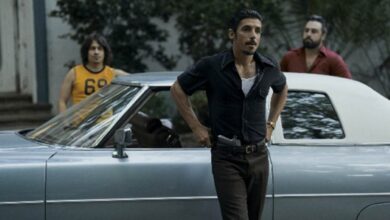Artificial Intelligence In The Cinema: 4 Films That You Cannot Miss
The cinema amazingly portrays some of how technology can turn against us. Here we take a tour of Artificial Intelligence in the cinema through 4 films.

Photos: internet
LatinAmerican Post | Vanesa López Romero
Escucha este artículo
Leer en español: Inteligencia Artificial en el cine: 4 películas que no te puedes perder
For centuries humans have considered the possibilities and reasons for our extinction. Pandemics, natural catastrophes, nuclear bombs, there are many options; However, there is one in particular that draws a lot of attention due to its nature: what would happen if artificial intelligence, created by humans themselves, turn against us? Literature and cinema have taken it upon themselves to explore the fears and dangers of AIs, and the results are not only terrifying but also fascinating. Here we take a tour of Artificial Intelligence in the cinema.
One of the most recent and successful films dealing with this issue is "M3GAN", which stars a life-size doll with artificial intelligence whose purpose is to help raise children, but which ends up generating panic and chaos. If you have already seen "M3GAN" or are interested in this topic, here we recommend 4 films that will surely have you glued to the screen from start to finish.
"2001: A Space Odyssey" (1968)
We start with Stanely Kubrick's classic based on the literary work of Arthur C. Clark. Fifty-five years after its release, “2001: A Space Odyssey” is still considered a milestone regarding special effects, cinematic storytelling, and, of course, scientific accuracy. Its plot centers on a team of astronauts who follow the signals emitted from a monolith on the Moon, which appears to be the product of an extraterrestrial civilization.
Among the multiple themes that the film addresses, there are also the dangers of artificial intelligence, which is developed in the third part of the film, "Mission to Jupiter." HAL 9000 is the mainframe computer in charge of directing the Discovery 1 spacecraft, in which five astronauts travel. Three of them travel in a state of hibernation and two, David Bowman and Frank Poole, awake.
HAL 9000 has eye-simulating cameras and microphones and speakers throughout the spacecraft, making it easy to communicate with astronauts. Everything seems to be going according to the flight plan, but things go sour when HAL announces glitches that don't seem to exist, and the astronauts begin to doubt its reliability.
In creating the character of HAL, Kubrick consulted with Irving John Good. This was one of the mathematicians who collaborated with Alan Turing (artificial intelligence pioneer) in the mission to break the Nazi Enigma code during World War II.
"Matrix" (1999)
The tetralogy of the Wachowski sisters that revolutionized science fiction cinema in terms of special effects cannot be missing from this list. Furthermore, it popularized the philosophical concept of an oppressive false reality, or in other words, the question of whether we live in a simulation. “Matrix” is parred excellent film that problematizes the uprising and the dominance of artificial intelligence, since it pushes the power of this technology to the limit. There, the AI is capable of not only ending the human species as it is known but also controlling it and making it believe that the dominance of the machines never happened from a virtual reality connection network.
In the film, we are told that before reaching this point, humans waged a war against the machines and lost. Those who were captured are connected and controlled by the matrix and serve to sustain the devices energetically, but those who managed to escape now seek to free humanity and win the war. Neo, the protagonist of the franchise, is considered the Chosen One by the group of rebels and it is he who fights against the machines outside and inside the simulation.
Read also: Review of "M3GAN": the fear of technology is real
"Ex Machina" (2014)
This tape is written and directed by Alex Garland (“Annihilation” and “Men”) and was awarded the award for best science fiction film at the Critic's Choice Awards and the Oscar for best special effects in 2016. The plot centers on Caleb, a programmer who works for a computer company and who, by winning a contest, has the chance to visit the president of the company in his remote research center in Alaska. Upon arrival, Nathan Bateman, the eccentric millionaire, confesses that he is working on artificial intelligence. He also tells him that he has brought him to the facility to perform the Turing test, which consists of exhibiting human behavior in machines, on the android AVA, which has a female physical form. Caleb initiates the test with AVA, but soon develops a romantic connection with her, to the point of feeling a deep attraction.
It is precisely from the latter that the problem of the tape is generated, what happens when sex is assigned to artificial intelligence and the AI develops an awareness that it can seek and maintain interpersonal relationships? Throughout the film, we see how problematic this is on a moral level, but the domination of the human being over these technologies is also problematized.
“The Mitchell Family vs. The Machines” (2021)
Although “The Mitchell Family vs. Las Máquinas” does not meet the scary factor of the other films on this list, it is recommended for addressing this issue from another perspective. Our last recommendation handles this theme in an animated comedy film, which is usually intended for the action or horror genre.
This is Mike Rianda's directorial debut, and it follows the story of the Mitchells, a family accidentally left free after the artificial intelligence PAL takes control of the entire world. This family comedy is not only entertaining but also has dramatic moments and brings to the fore the danger that artificial intelligence with advanced cognitive abilities will eventually be considered obsolete and may end up having feelings of resentment and revenge.




